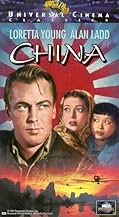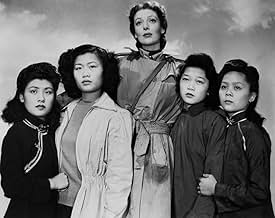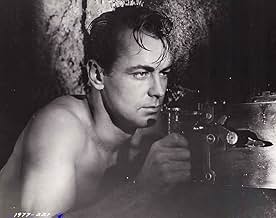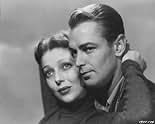Agrega una trama en tu idiomaDuring the Japanese invasion of China, a cynical, macho profiteer meets a compassionate, beautiful schoolteacher.During the Japanese invasion of China, a cynical, macho profiteer meets a compassionate, beautiful schoolteacher.During the Japanese invasion of China, a cynical, macho profiteer meets a compassionate, beautiful schoolteacher.
- Dirección
- Guionistas
- Elenco
- Premios
- 2 premios ganados en total
Victor Sen Yung
- Lin Wei, Third Brother
- (as Sen Yung)
Doris Chan
- Student
- (sin créditos)
- Dirección
- Guionistas
- Todo el elenco y el equipo
- Producción, taquilla y más en IMDbPro
Opiniones destacadas
During WWII, American film studios made tons of films featuring the enemy as monsters...snarling, drooling, evil monsters. Much of this is understandable....the country was at war. But many of these depictions went way overboard...so much so that the films seem very dated today. "China", unlike some of the more severe depictions of the enemy, is actually a bit more realistic. In fact, it's so realistic in spots that the film is much more brutal and frank than you'd expect from a Post-Code American picture.
The story is set in China just before the US entered the war in 1941. China, in contrast to the US, had been at war with China for about a decade...with Japan invading eastern China and in many cases eliminating the locals completely. So, when the film show the Japanese army doing ethnic cleansing, it's actually pretty realistic...ugly...but realistic. In addition, rapes and murders of civilians were common...and the film actually manages to show much more than I'd expect. I also mention this because the film CAN be hard to watch in places...especially in the portion where there is a rape and murders of a family. Because of this, it's far better than the average wartime propaganda movie.
Alan Ladd and William Bendix star as Americans who work for an oil company. This work brought them to China...and Ladd's character, in particular, seems more than willing to sell to the Japanese or Chinese. However, through the course of the story, he sees more and more of the Japanese atrocities and eventually joins the resistence wholeheartedly. Along for the ride is a missionary lady (Loretta Young).
A few things about the film could have been better. In particular, the casting was odd. Ladd was fine in his usual grumpy disaffected role, but Young and Bendix were all wrong. Young plays an American born and raised in China...and she seems as Chinese-American as a taco! Bendix isn't as bad, but he's supposed to be from Oregon...but he sure sounds like Brooklyn (though he apparently was from Manhattan).
On the positive side, the film did not shy away from things and was BRUTAL. While the rape was not shown, it was STRONGLY implied and you could hear the screams. As for the killing, much of it was in hand-to-hand combat and was amazingly harsh for 1943. I appreciate that, as too often war films make war seem fun or easy...here, there is great sacrifice and realism as a result. Overall, very well worth watching and one of Ladd's best.
The story is set in China just before the US entered the war in 1941. China, in contrast to the US, had been at war with China for about a decade...with Japan invading eastern China and in many cases eliminating the locals completely. So, when the film show the Japanese army doing ethnic cleansing, it's actually pretty realistic...ugly...but realistic. In addition, rapes and murders of civilians were common...and the film actually manages to show much more than I'd expect. I also mention this because the film CAN be hard to watch in places...especially in the portion where there is a rape and murders of a family. Because of this, it's far better than the average wartime propaganda movie.
Alan Ladd and William Bendix star as Americans who work for an oil company. This work brought them to China...and Ladd's character, in particular, seems more than willing to sell to the Japanese or Chinese. However, through the course of the story, he sees more and more of the Japanese atrocities and eventually joins the resistence wholeheartedly. Along for the ride is a missionary lady (Loretta Young).
A few things about the film could have been better. In particular, the casting was odd. Ladd was fine in his usual grumpy disaffected role, but Young and Bendix were all wrong. Young plays an American born and raised in China...and she seems as Chinese-American as a taco! Bendix isn't as bad, but he's supposed to be from Oregon...but he sure sounds like Brooklyn (though he apparently was from Manhattan).
On the positive side, the film did not shy away from things and was BRUTAL. While the rape was not shown, it was STRONGLY implied and you could hear the screams. As for the killing, much of it was in hand-to-hand combat and was amazingly harsh for 1943. I appreciate that, as too often war films make war seem fun or easy...here, there is great sacrifice and realism as a result. Overall, very well worth watching and one of Ladd's best.
Alan Ladd is a guy making an easy buck in the war between Japan and the Nationalist Chinese forces, selling oil products to the advancing Japanese. He has William Bendix working for him, and Bendix is a little soft in the heart, rescuing Chinese babies in bombed out cities and so forth. Then they are joined by missionary Loretta Young, who persuades Ladd against his better judgment to fill his truck with young Chinese girls and head west before the Japanese get them. But one girl jumps off the truck to go take care of her parents. It's Ladd who goes to find her, and what he sees changes his mind about this being a place to just make a buck.
Until just after the halfway mark it's a straightforward adventure, with Ladd in cynical mode. After that it turns into a propaganda piece, and this being wartime, there's one Code-breaking shot as one of the Chinese commandos drives a knife into a Japanese soldier in full view. Cameraman Leo Tover shoots it and other shots in strongly shadowed light, and shoots the sort of 'group portrait' shot that director John Farrow liked to use, when he isn't shooting the leads in close-up. It's the sort of propaganda adventure movie that the studios were making during the Second World War, and putting some strong leads in. Fortunately for the budget, you've got Ladd and Miss Young on the first card, Bendix gets his name alone n the second, and the third card has five actors, all of them Asian Americans, including Philip Ahn and Sen Yung.
Until just after the halfway mark it's a straightforward adventure, with Ladd in cynical mode. After that it turns into a propaganda piece, and this being wartime, there's one Code-breaking shot as one of the Chinese commandos drives a knife into a Japanese soldier in full view. Cameraman Leo Tover shoots it and other shots in strongly shadowed light, and shoots the sort of 'group portrait' shot that director John Farrow liked to use, when he isn't shooting the leads in close-up. It's the sort of propaganda adventure movie that the studios were making during the Second World War, and putting some strong leads in. Fortunately for the budget, you've got Ladd and Miss Young on the first card, Bendix gets his name alone n the second, and the third card has five actors, all of them Asian Americans, including Philip Ahn and Sen Yung.
This is no war propaganda but as sheer realism as could be accomplished in filming on the Apache trail of Arizona. The main asset of the film is therefore no great landscapes and interesting interiors of Chinese life but the actors and their relationships. The trio of William Bendix, Alan Ladd and Loretta Young is invincible in their glorious acting and characters, Alan Ladd and Loretta Young being at daggers drawn from the beginning but gradually being joined by the circumstances. Already the first scenes, a long shot with only William Bendix wandering at a loss among the ruins of a bombed city being under attack and ending up with a lost baby, is as impressive as if it was an Orson Welles invention. That quality is sustained throughout the film. Loretta Young will win your heart from the start, William Bendix will gain your sympathy from the beginning and increase it until the end, and Alan Ladd is at his very best, the toughest of guys but totally stoic. John Farrow made many efficient thrillers in the 40s and 50s, but I think this is his one outstanding war film. Victor Young graced it with his music, and the dialog is pertinent all the way. The suspense keeps increasing until the final crisis and climax, and then the war just continues. China had a hard time against the Japanese, the action of this film is prior to Pearl Harbour, although that incident is part of the finale, but the Chinese are depicted with great sympathy, also Chang Kai Shek. No mention of the communists - they came later.
Dusted off from long time in the vault, John Farrell's 'China' surprises. Allan Ladd plays a cynical, war profiteer, a part well chosen for him. He sells to the highest bidder: the Imperial Japanese waging war against the Nationalist troops, short of money, but not in men. And then there's doe eyed Loretta Young, born and bred in China and with missionary fervor remains in China to aid and assist her students, refugees. William Bendix as Ladd's side kick has a tender heart and is a sucker for an abandoned baby.
But the surprise are the Asian actors...Korean Philip Ahn, Chinese Richard Loo and Victor Sen Yung and Marion Quon, among others, who usually plays small parts in Chan Chin films.
Here, in 'China', at war, they have strong roles who force at the end of a barrel of a gun, to do as they want in their fight against the invading Japanese. They are forceful, intelligent and well able to fight with the Americans playing as it turns out to be in the background.
Amazing? In a way, our allies in the fight against Japanese militarism, but in the US declared by act of Congress as a 'cursed minority', restricted in immigration, forced to live in ghettos quaintly known as 'China towns',centers of opium dens, intrigue and possibly engaged in white slavery.
All the prejudice aside, 'China' is an exception. The Chinese characters speak good, standard ordinary English and are robust in character and know what they want to free China from Japanese aggression.
Of course, Ladd has a change in heart, helps the Chinese to entrap Japanese troops. And in that he's ennobled by his sacrifice for all that's good and pure in America; he finds love in Young, and Bendix remains true to his heart.
It's a pity, it is not shown on the television or in cinema clubs.
Shortly before Pearl Harbor, American opportunist Jones and partner Johnny are in China to sell oil to the invading Japanese army. Cynical about the sufferings of the Chinese, Jones meets compassionate teacher Carolyn Grant while travelling cross-country to Shanghai. Sparks fly between these strong-willed characters, neither budging an inch. But when Jones witnesses a Japanese atrocity, his feelings toward his customers (and Carolyn) begin to change...
A very good war adventure that starts leisurely, featuring a hard-headed American who sells oil to the Japanese and doesn't care about the atrocity caused. He's played by Alan Ladd, who does a good job as the grumpy trucker. William Bendix is a much more cheerful sidekick in contrast, and cares about people and even finds a baby amidst the war torn area.
Of course, Loretta Young as a teacher helping some Chinese kids reach their destination soon thaws Ladd's heart, and that's also helped by a surprising harrowing and brutal scene where they find the baby (Bendix had found), mother and father of a girl dead, and the girl in the house with Japanese soldiers in an implied assault scene. The action scenes are rousing and can be starkly brutal. The ending is quite shocking too with a redemptive note.
A very good war adventure that starts leisurely, featuring a hard-headed American who sells oil to the Japanese and doesn't care about the atrocity caused. He's played by Alan Ladd, who does a good job as the grumpy trucker. William Bendix is a much more cheerful sidekick in contrast, and cares about people and even finds a baby amidst the war torn area.
Of course, Loretta Young as a teacher helping some Chinese kids reach their destination soon thaws Ladd's heart, and that's also helped by a surprising harrowing and brutal scene where they find the baby (Bendix had found), mother and father of a girl dead, and the girl in the house with Japanese soldiers in an implied assault scene. The action scenes are rousing and can be starkly brutal. The ending is quite shocking too with a redemptive note.
¿Sabías que…?
- Trivia"Lux Radio Theater" broadcast a 60 minute radio adaptation of the movie on November 22, 1943 with Loretta Young, Alan Ladd and William Bendix reprising their film roles.
- Citas
Blonde Russian: What's that?
Johnny Sparrow: A baby. What do you think it is - Donald Duck?
- ConexionesFeatured in The Movie Orgy (1968)
Selecciones populares
Inicia sesión para calificar y agrega a la lista de videos para obtener recomendaciones personalizadas
- How long is China?Con tecnología de Alexa
Detalles
- Fecha de lanzamiento
- País de origen
- Idiomas
- También se conoce como
- The Fourth Brother
- Locaciones de filmación
- Apache Trail, Arizona, Estados Unidos(location shooting)
- Productora
- Ver más créditos de la compañía en IMDbPro
Taquilla
- Presupuesto
- USD 2,000,000 (estimado)
- Tiempo de ejecución
- 1h 19min(79 min)
- Color
- Relación de aspecto
- 1.37 : 1
Contribuir a esta página
Sugiere una edición o agrega el contenido que falta





























